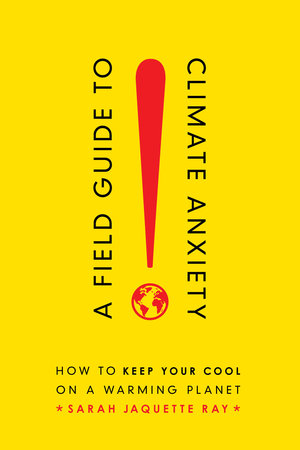As a reoccurring feature on the Sustainability Roundtable blog, we will post reviews of books related to sustainability. Interested in submitting your own review to the blog? Contact August at aolundsmith@gmail.com.

A Field Guide to Climate Anxiety: How to Keep Your Cool on a Warming Planet by Sarah Jaquette Ray, University of California Press, 2020
Review by Beth Filar Williams
Dr. Sarah Jaquette Ray, a professor of environmental studies at Humboldt State University, wrote this book after realizing that her students could not even envision a positive livable climate-changed future from the results of collective effort of many. Not because these students / this generation are lazy or do not care – more so they DO care but feel powerless and are constantly bombarded with all that is wrong and seemingly unfixable, handed to them from the older generation. Why should they even try when it’s not possible to get a positive end game? Frozen by fear, guilt or grief, how can anyone even imagine a desired future?
She begins the book speaking to the youth of today, naming their shared characteristics (like caring about social justice and climate change, two things that are linked); the financial insecurity they have beyond what any other generation has faced; the growing disparity between the rich and everyone else and also that they are the more ethnically diverse as a generation than any other generation before them. Even conservatives in Gen Z care about climate justice, unlike older generations in general. Dr. Ray wrote this book to help us combat climate change and injustice while grappling with feelings of powerlessness and despair. Ray offers strategies for climate justice activists to avoid burnout, pulling together works of adrienne maree brown’s emergent strategy, Per Epsen Stoknes’s Five Ds, Bob Doppelt’s transformational resilience, Rebecca Solnit’s justice work, and Glenn Albrecht’s solastalgia, just to name a few.
This book can be read linearly or non-linearly by picking any chapter. Starting with happiness and how you really find it in life to mindfulness to cultivating climate wisdom helps set a tone that is not found in many climate change books. Keys in this book are to find pleasure in the work, slow down and be mindful, remember this is not a new crisis, find what you can do well and do that part, it takes a community, and you need to be able to dream of desires and envision a possible future!
Though written for Ray’s college students, this “existential toolkit for action” is also great for anyone who wants to do something about the climate crisis but struggles with anxiety when faced with the dire predictions of climate scientists. A fabulous read for a book club. Not really long, written for nonscientists, and each chapter has bullet points that would be great reflection questions or turned into discussion topics.
A few discussion questions
- How do you experience or observe the role of emotions in climate justice work?
- The heart, the hand, and the head are all needed for sustained engagement. What are the effective implications of the content you are daily exposed to?
- Write your own manifesto. Why do you care about the planet, the suffering, and what are you skilled or passionate about that you can do? This can be an activity for reflection/writing/sharing.
Related resources:
Teaching Climate Change: Two Insights by Sarah Jaquette Ray